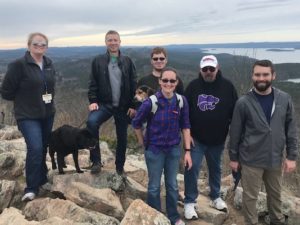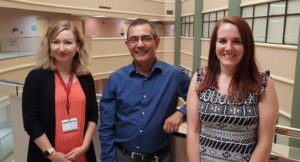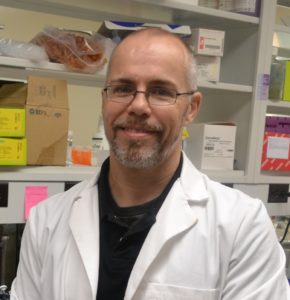Alan Tackett, PhD will host Research and Innovation’s 1st gathering for informal networking, casual mentoring at noon on March 2, 2021. The 1st Tuesday of each month, Research Antipasto’s host will share career experiences, stories, answer questions, advise, astound, and amaze…for 20 – 30 minutes. Just show up, have fun, and get to know others in the research community! Hosts will be posted on the research calendar.
Department News
Congratulations Dr. Alkam!
Congratulations to Duah Alkam who successfully defended her Ph.D. dissertation entitled “Using genome-wide transposon sequencing (TnSeq) to identify osteomyelitis-critical Staphylococcus aureus genes” on January 28th. Duah was a student in the laboratories of Dr. Mark Smeltzer and Dr. David Ussery and is now working as in the UAMS Bioinformatics Shared Resource under the direction of Dr. Stephanie Byrum.
Dr. Diekman honored for teaching excellence
Congratulations to Alan Diekman who was recently awarded a College of Medicine Teaching Excellence Award.
Top Five Article
An article by Dr. Giulia Baldini, Professor of Biochemistry and Molecular Biology, and Dr. Kevin Phelan, Professor of Neurobiology and Developmental Sciences, was one of the top five most-cited articles in the Journal of Endocrinology in 2020. Dr. Baldini and Dr. Phelan coauthored “The melanocortin pathway and control of appetite – progress and therapeutic implications,” which was published in April 2019. Congratulations.
Welcome Dr. Miah
Sayem Miah, Ph.D. is a new Assistant Professor in the Biochemistry and Molecular Biology Department.
Research statement
My research vision is to understand how cells perceive signals that vary in healthy and cancer cells and how this perception regulates tumorigenesis and metastasis. My lab will undertake a “systemwide” interrogation of signaling networks using innovative proteomic, biochemical, and genomic techniques – to uncover how the cell decodes information within complex and combinatorial signals. We will apply these approaches to quantitatively understand healthy and cancer cell signaling in cellular decisions. For example, a long-standing biological paradox is that TGFβ signaling, which is thought to be anti-metastatic, can switch to promoting metastasis. But how the anti-metastatic function of TGFβ/SMAD signaling switches to a metastasis promoting factor is poorly understood.
Recently, we reported that breast tumor kinase (BRK), a non-receptor tyrosine kinase (nRTK), which is an oncogene and highly expressed in ~85% of human invasive ductal carcinomas, promotes metastatic potential by phosphorylating SMAD4 in mammary epithelial cells. Another family member of nRTKs, Src phosphorylates TGFβ type II receptor to promote tumor growth and metastasis. Additionally, PEAK1, induces EMT and metastasis in breast cancer cells via TGFβ/SMAD signaling.
This makes nRTKs a viable and promising target for tackling metastatic cancer—if only we knew which specific kinases needed to be targeted in order to block metastatic progression.
Opportunities for collaboration
I am highly collaborative in nature. I want to see your science and mine flourish. Please reach out if I can contribute in your science, or you in mine.
Fun fact about yourself
I never say no to coffee.
Favorite place you’ve lived
I spent first 12 years of my life in a rural village in Bangladesh. It was a full of life and close to nature.
Favorite food
Any Mediterranean food
What you like to do for fun
I love to play Ping-Pong and Soccer.
Oleg Karaduta appointed to JMSACL editorial board
Congratulations to Dr. Oleg Karaduta who has been appointed to the Editorial Board (section Proteomics) of the Journal of Mass Spectrometry & Advances in the Clinical Lab (JMSACL). Previously Dr. Karaduta received US Young Investigator Educational Grant from the abovementioned Association.
December publications

Multi-omics data integration considerations and study design for biological systems and disease.
Graw S, Chappell K, Washam CL, Gies A, Bird J, Robeson MS 2nd, Byrum SD.
Mol Omics.

Urbaniak A, Piña-Oviedo S, Yuan Y, Huczyński A, Chambers TC.
Eur J Pharmacol.

G-Quadruplex loops regulate PARP-1 enzymatic activation.
Edwards AD, Marecki JC, Byrd AK, Gao J, Raney KD.
Nucleic Acids Res.

Gujarathi S, Zafar MK, Liu X, Eoff RL, Zheng G.
Molecules.
Dr. Byrum invited as guest editor
As a Guest Editor for JoVE, Dr. Stephanie Byrum is organizing a Methods Collection titled “Cutting-edge technologies driving quantitative mass spectrometry“.
JoVE is the leading peer-reviewed scientific methods video journal, aimed at increasing the visibility and reproducibility of research. JoVE’s team takes care of the entire process of filming and producing your video.
This Methods Collection will be the definitive record of quantitative mass spectrometry and bioinformatics techniques and set the standard for reproducibility within the community. The collection will cover advanced experimental approaches in the field.
Once complete, this collection will be distributed to a comprehensive list of researchers who are active in the field. This will promote collaboration among researchers in the community and facilitate wider adoption of innovative methodologies.
This collection will be the go-to resource for methods in the field for years to come.
If you are interested in contributing, please submit an abstract of a maximum 300 words by February 15, 2021. The full-length manuscript should be submitted by April 15, 2021.
Dr. Miousse to present for CTSA Grand Rounds

Dr. Byrd receives Hornick Endowment Grant
Congratulations to Dr. Alicia Byrd on receiving research funding of $25,000 from the Hornick Endowment Grant Program. This award is for one (1) calendar year and will fund additional research related to Dr. Byrd’s grant entitled “The effect of rs75770066, a stroke associated single nucleotide polymorphism, on enzyme activity”.
